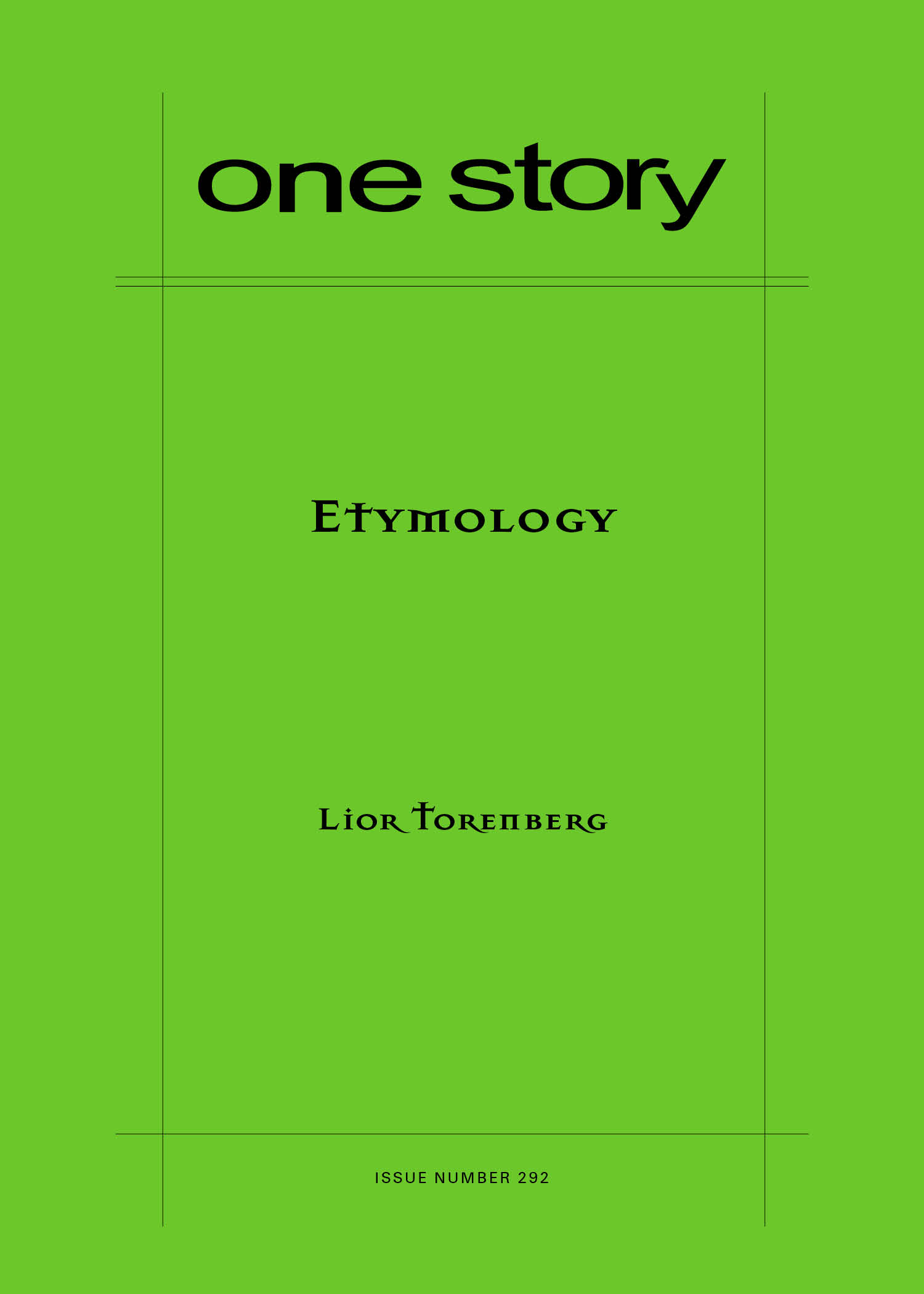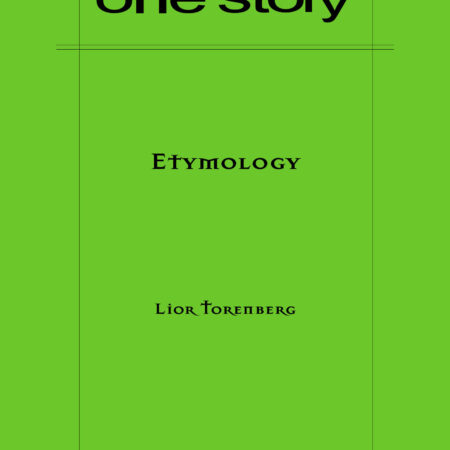
Etymology
$2.50
533 in stock
Excerpt
The first time I see her, it’s dusk and I’m eating a green apple, plopped down on a bench outside, next to the new suitcase I bought at the dollar store. The suitcase wasn’t a dollar, not even close. Still, it was cheap enough, and I needed something to wheel my scant belongings around in. I use a box cutter to cut slices off the apple. I’m allergic to the fruit—its skin makes my throat rattle and itch and I have to drink water until it calms down. There’s a lot of coughing and throat clearing, then the sensation passes, and I take another bite.
I arrived in New York early this morning, and now I’m moving into Ash’s apartment. Any second now I’ll get up and wheel my suitcase in, press the button on the elevator, and knock on his door. I just need to sit down for a moment. I wonder if he can sense that I’m outside, if at any moment he’ll look out the window and tell me not to linger. It’s dangerous, he might say. Come inside.
And I might tell him I don’t have anything worth stealing. I shouldn’t argue with him, though—especially if I’m going to leave him. Anyway, joke’s on whoever tries to steal my suitcase. There’s nothing in there but a book, toiletries, and some clothes. But what about me? I could get stolen, too.
Lior Torenberg
Lior Torenberg is an Israeli-American writer and editor. She received her graduate degree in Creative Writing at New York University. Her work has been published with The Poetry Society of New York, december, the United States Library of Congress’ Pandemic Archives, and more. Find her on Twitter at @LTorenberg.
Patrick Ryan on “Etymology”
Our new issue opens as a young woman sits on a bench and uses a box cutter to slice and eat an apple—a fruit she’s allergic to, she tells us. It’s an opening that grabs our attention in a couple of different ways. For one thing, we can’t help but wonder why someone’s willfully eating a fruit they know they’re allergic to, and for another, what’s with that box cutter? If the presence of Chekhov’s gun implies the gun is going to be fired, is this box cutter going to reappear?
“Etymology” is the story of Eleanor, the above-mentioned apple-eater who, in the wake of her mother’s death, runs away from her home and a bad situation, only to find herself in another home and another bad situation. But this time, there’s someone who seems to understand her predicament: the next-door neighbor, a woman named Morgana. Morgana is anything but cuddly (she also has a bloody-lipped cat who loves to hunt), but she’s kind to Eleanor upon meeting her and seems to already understand something about her. As Eleanor’s situation worsens, Morgana begins to communicate with her through the bathroom wall. Telepathically.
Lior Torenberg has made some bold choices in this story, not the least of which is an almost tight-lipped first-person narrator whose calm delivery doesn’t always match the events being reported on. What’s said is sometimes jaw-dropping, but it’s what’s not said that resonates. We hope you enjoy “Etymology” as much as we did.
Q&A by Patrick Ryan
- PR: Where did you get the idea for “Etymology”?
- LT: I stumbled upon the word adorcism online, which refers to voluntary or desired possession. Like Eleanor, I tend to get stuck on words. This word floated around in my brain for a few weeks before it gelled into a narrative about a woman who is obsessed with her neighbor, and would like nothing more than to be inhabited by her. The original title of this piece was “Adorcism.”
- PR: How long did it take you to finish a draft you were happy with?
- LT: I wrote one quick draft to satisfy my gut and try to achieve the atmosphere I wanted. Before my second draft, I did a lot of online research and consulted with a friend of mine who is an expert in all things witchcraft. The third draft was for line edits and structure, and I also sent it to a few key readers for feedback. I sent the fourth draft to One Story. The whole writing process took about two months.
- PR: Were there any surprises for you in the writing of this story?
- LT: Eleanor frightens me. It’s the idea of being without agency. She’s locked up in a tower with a person she hates. Her life is small and, even if she could, she’s afraid to make it bigger. By the ending, I wasn’t put off by her violence, but I was relieved that she had finally made a decision.
- PR: The point of view is crucial to the story. And the voice of Eleanor, the narrator, is a huge part of that. Was the story always going to be written in Eleanor’s voice, or did you ever imagine it—or try writing it—from a different perspective?
- LT: In my mind, it was always Eleanor because the idea sprouted from her desire to be possessed. But I love that question, because writing from someone’s perspective is inhabiting them in a way, too. I never felt that I wanted to inhabit Ash, but I am keen on the relationship between Morgana and her feline familiar, and that could be a point of view to explore.
- PR: How would you describe Eleanor’s voice?
- LT: We’re finding her during a low point in this story. She’s someone who’s experienced great loss with her mother’s passing, had a life-altering burst of agency when she left home, and is now coming down from that, taking a few steps backwards in her growth for a sense of stability and security. Her voice is controlled on these pages, but confident in its own way, and I have a feeling she’s funnier than she lets on.
- PR: Without giving anything away, the ending of “Etymology” leaves a lot of what could be called loose ends. How important was it, to you, to leave certain aspects of the story unresolved—or, at least, not resolved in any definitive way?
- LT: For me, there is an ending behind the ending. Her mother is the moon of her world, a distant object in the sky that she longs for. Her mother and Morgana meld into each other in her dreams as well. To me, the ending contains a sense of return. A communion with the mother, or The Mother; the ultimate sense of security.
- PR: Will you ever write about Eleanor again?
- LT: Perhaps. I love all of my protagonists, Eleanor included, and think about them often. She’ll get in touch if she’s up to anything interesting.
- PR: What are you working on now?
- LT: I’m working on a novel about a streamer who does increasingly dangerous dares online to pay off her student loans. Financial pressure meets parasocial relationships. I’m also actively querying an LGBTQIA+ thriller.
- PR: What’s the best piece of writing advice you’ve ever received?
- LT: The best piece of writing advice I’ve received is actually a Martha Graham quote I return to often: “There is a vitality, a life force, an energy, a quickening that is translated through you into action, and because there is only one of you in all of time, this expression is unique. And if you block it, it will never exist through any other medium and it will be lost. The world will not have it.” Also, Lorrie Moore once told me to drink more coffee, and I treasure that advice.
